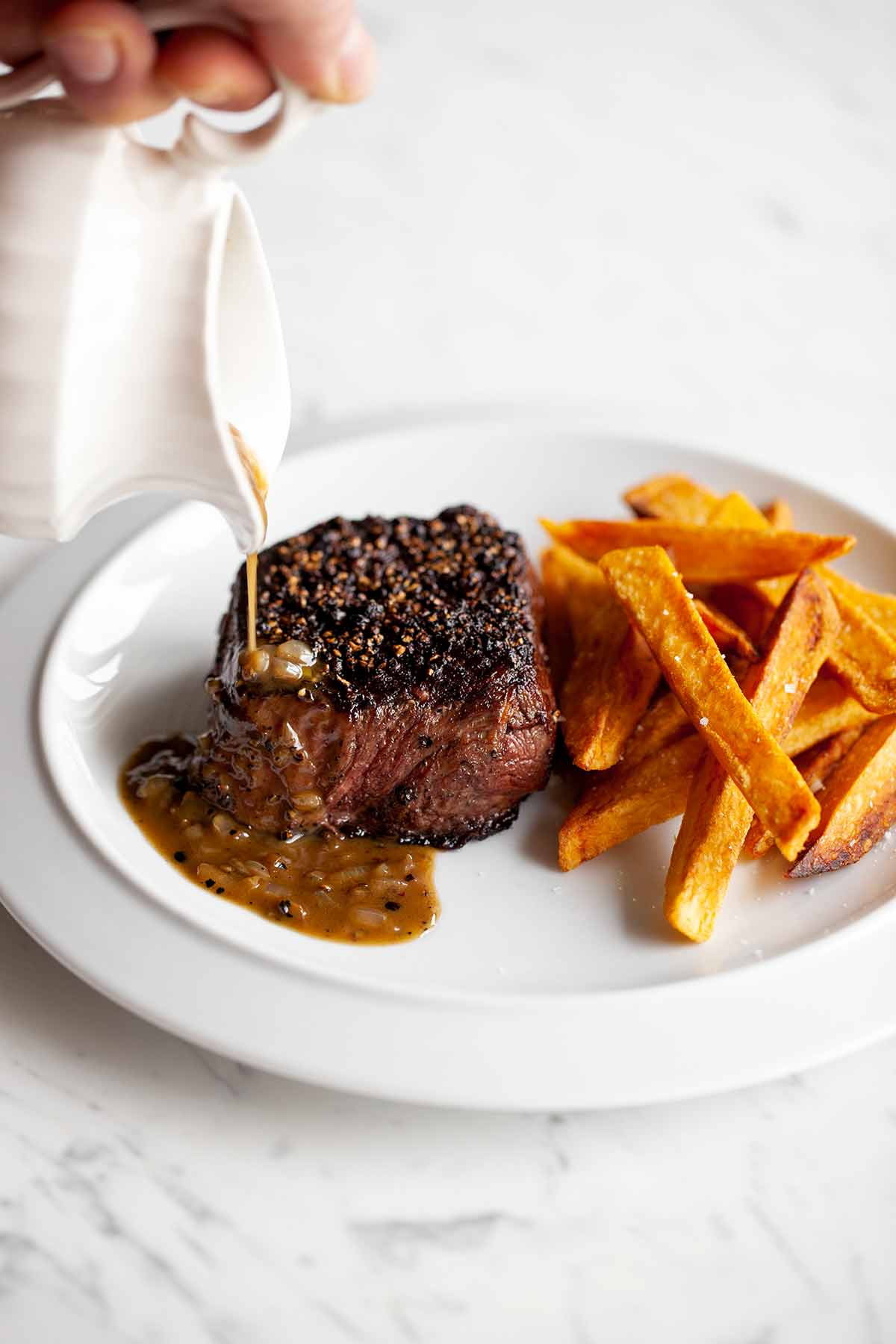
TL;DR (Quick-Answer Box)
- What it is: A classic French bistro dish featuring a thick-cut strip steak encrusted in a blend of peppercorns, finished with a flamed Cognac sauce.
- Why you’ll love it: It’s a masterclass in balance, pairing the heat of a five-pepper crust with a butter-enriched reduction. This Julia Child-inspired recipe is ready in under 30 minutes.
- How to make it: Encrust salted steak with crushed peppercorns and sear in oil and butter. While the meat rests, sauté shallots, deglaze + flambé with Cognac, and simmer with stock. Swirl butter into the sauce before serving.
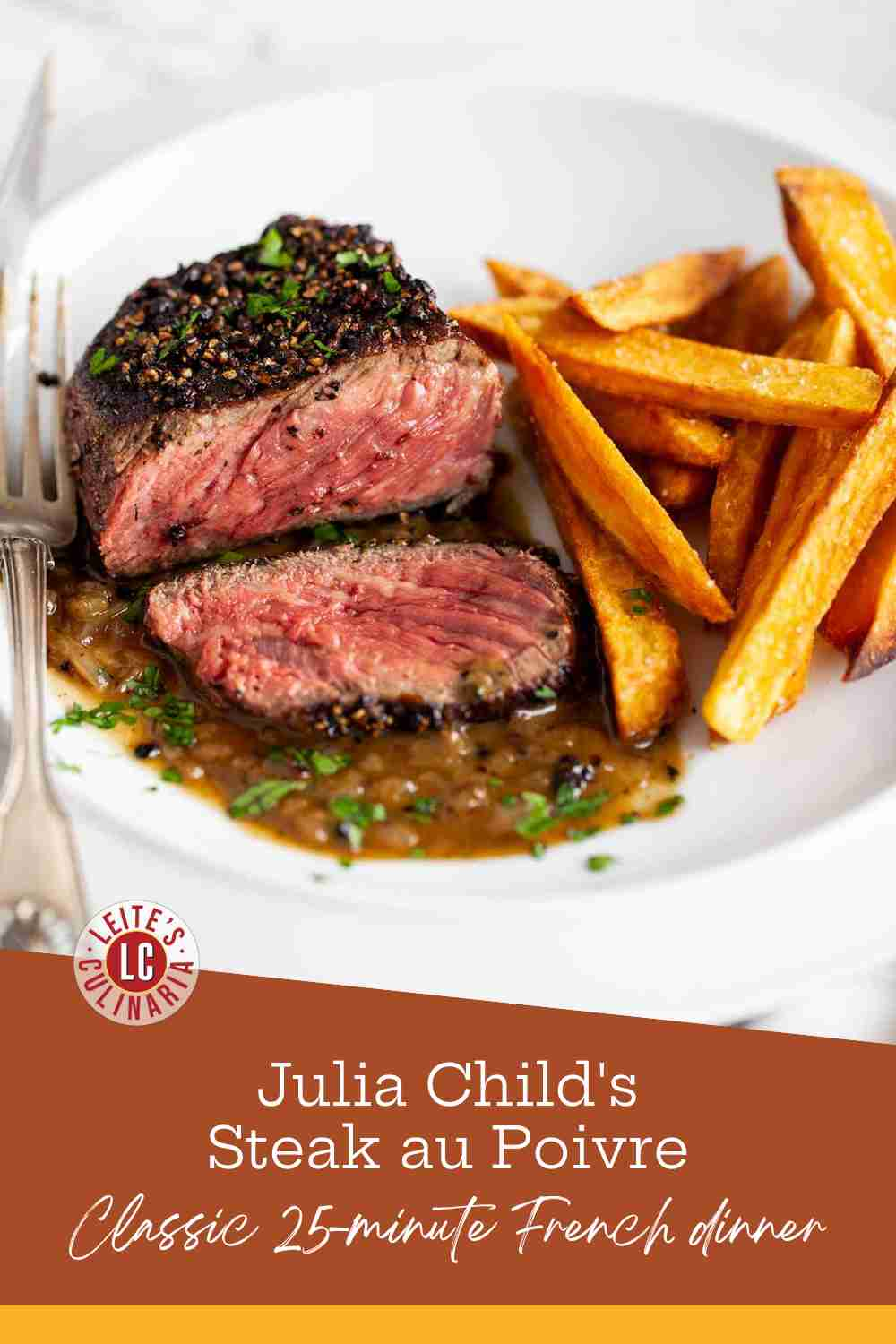
Jump To
- TL;DR (Quick-Answer Box)
- Why our testers loved this
- Notes on ingredients
- Visual step-by-step-guide: Steak au Poivre
- Your Steak au Poivre questions, answered
- Pro tips & troubleshooting
- Storage & reheating
- What to serve with Steak au Poivre
- More Superb Steak Recipes
- Write a Review
- Steak au Poivre Recipe
- Recipe Testers’ Reviews
The first time I had steak au poivre was way back in 1988 when I was a waiter at the famed Windows on the World restaurant on top of the World Trade Center in NYC. I remember grabbing a spare order, sneaking off to the dishwashing room, and scarfing it down. It was a revelation.
After I began cooking, I’ve made it countless times. And no recipe pays dividends as much as this classic. Rarely do so few pantry staples transformed into something stunning you can confidently serve to even the snobbiest food lovers. And it’s so quick to put together, you can have it on the table in less than 30 minutes. The only thing that could possibly improve upon this steak is proper french fries.
Chow,


Why our testers loved this
My testers were singing the praises of this classic French dish and described the tender steaks as “melt-in-your-mouth fabulous.” Daniela T. commented, “I never would have thought that a recipe like this would be a quick, easy weeknight dinner, but this absolutely was and surpassed my expectations.”
Notes on ingredients
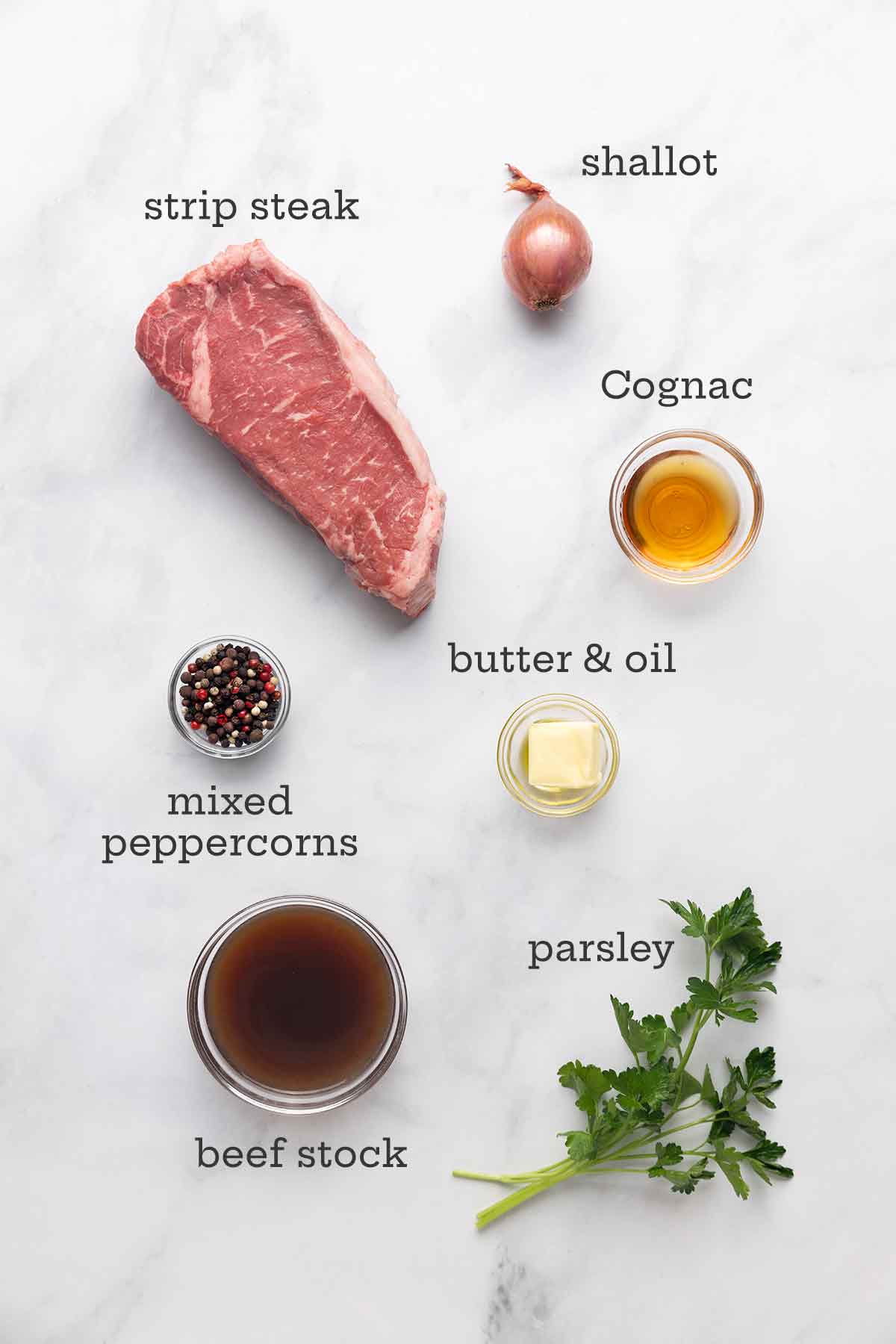
- Strip steak—Strip steak is a tender, well-marbled cut of meat from the short loin of a cow. You’ll also sometimes see it labeled as Kansas City or New York strip. The strip is exquisitely flavored, as it falls on the opposite side of the bone as the tenderloin, though it’s not nearly as buttery as the tenderloin.
- Shallots—Shallots add sweetness and complexity to the sauce. Make sure to mince them finely to avoid a chunky, uneven sauce.
- Peppercorns—You can use any type of peppercorn, but I highly recommend using a mixture, as the different varieties add unique flavors to the crust. Green peppercorns are classic for the dish, giving it a signature briny bite, But don’t stop there. Black pepper delivers fruitiness, white pepper adds an earthy flavor, Szechuan peppercorns bring tingling heat, and whole allspice offers warmth. I often add pink peppercorns to the mix, which lend a wonderful floral note.
- Cognac—This is a fine French brandy and comes with a hefty price tag. It’s well worth it for the flavor it adds to this dish, but if you’re on a budget, you can substitute a bargain brandy. Whatever you do, please don’t skip it. It balances the heat from the peppercorns.
- Stock—Beef stock works well here and adds plenty of flavor to the sauce without the heaviness of the more traditional cream sauce. If you’d like to make it with dark chicken stock, you can make your own by searing or roasting raw chicken pieces (backs, necks, and wings are ideal) until browned, then simmering them in water with carrots, celery, and onion for 2 to 3 hours. Strain the stock before using.
Visual step-by-step-guide: Steak au Poivre
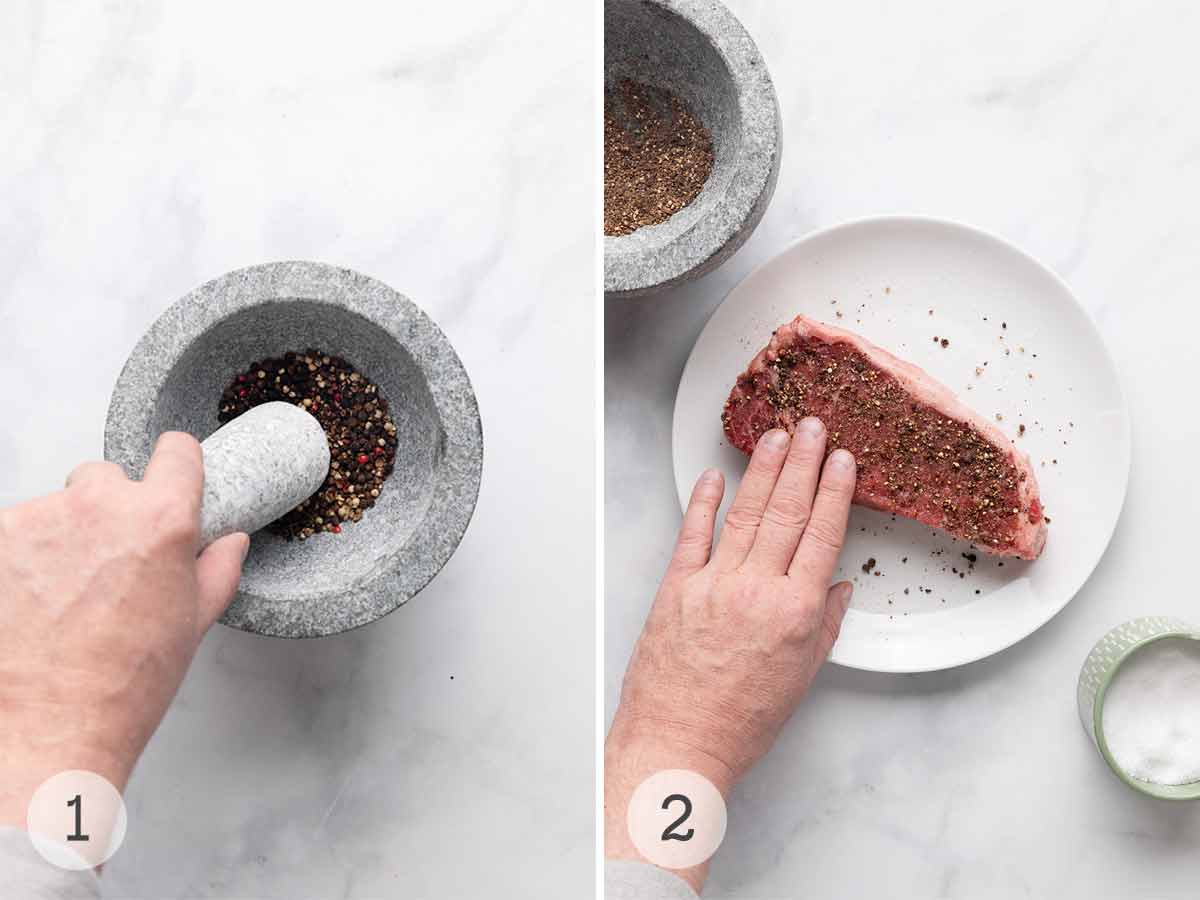
- Coarsely crush the peppercorns with a heavy skillet, spice grinder, or in a mortar and pestle.
- Season the steaks with salt, then press the peppercorns into each side into the peppercorns. Cut the meat into 2 pieces.
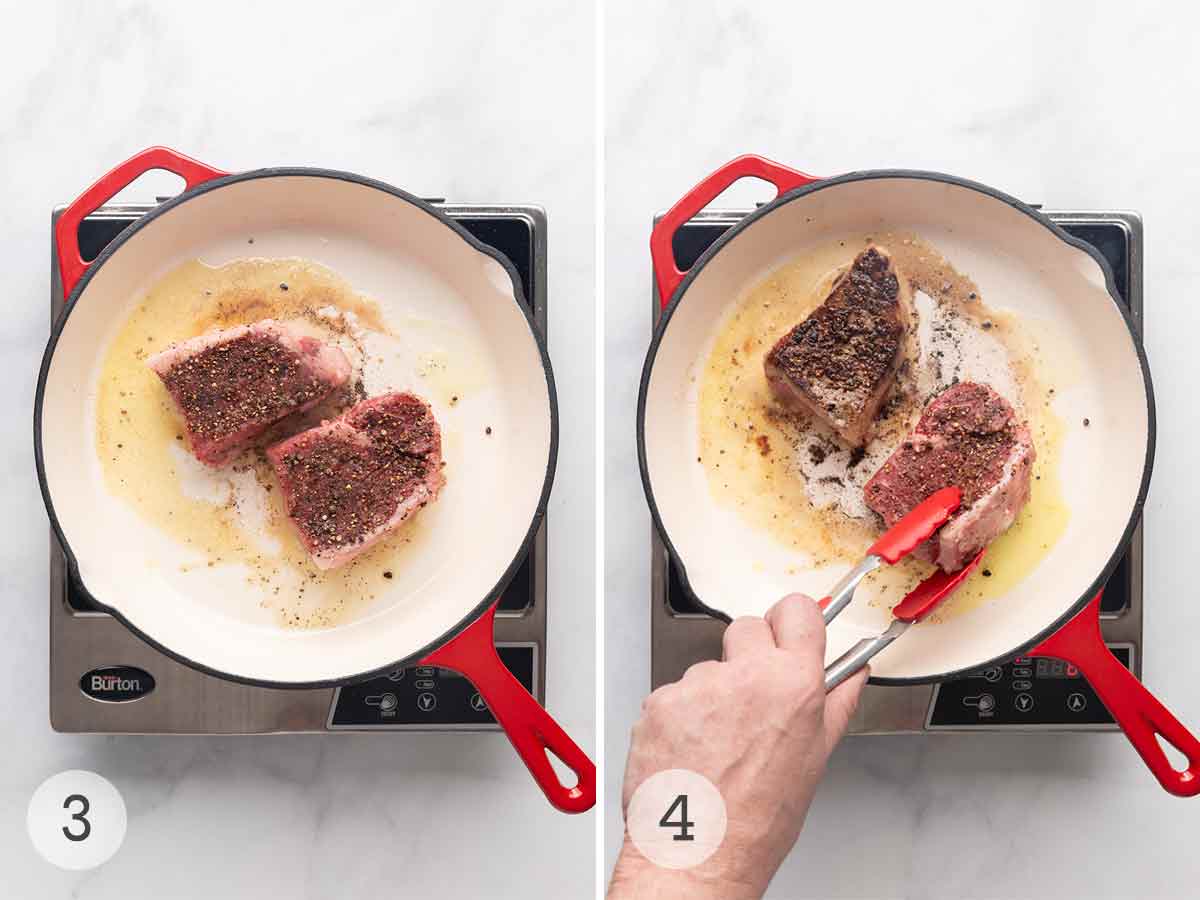
- Heat the oil and butter in a large skillet over high heat until very hot but not smoking.
- Sear the steak, flipping once until cooked to your desired doneness. Transfer to a platter to rest.
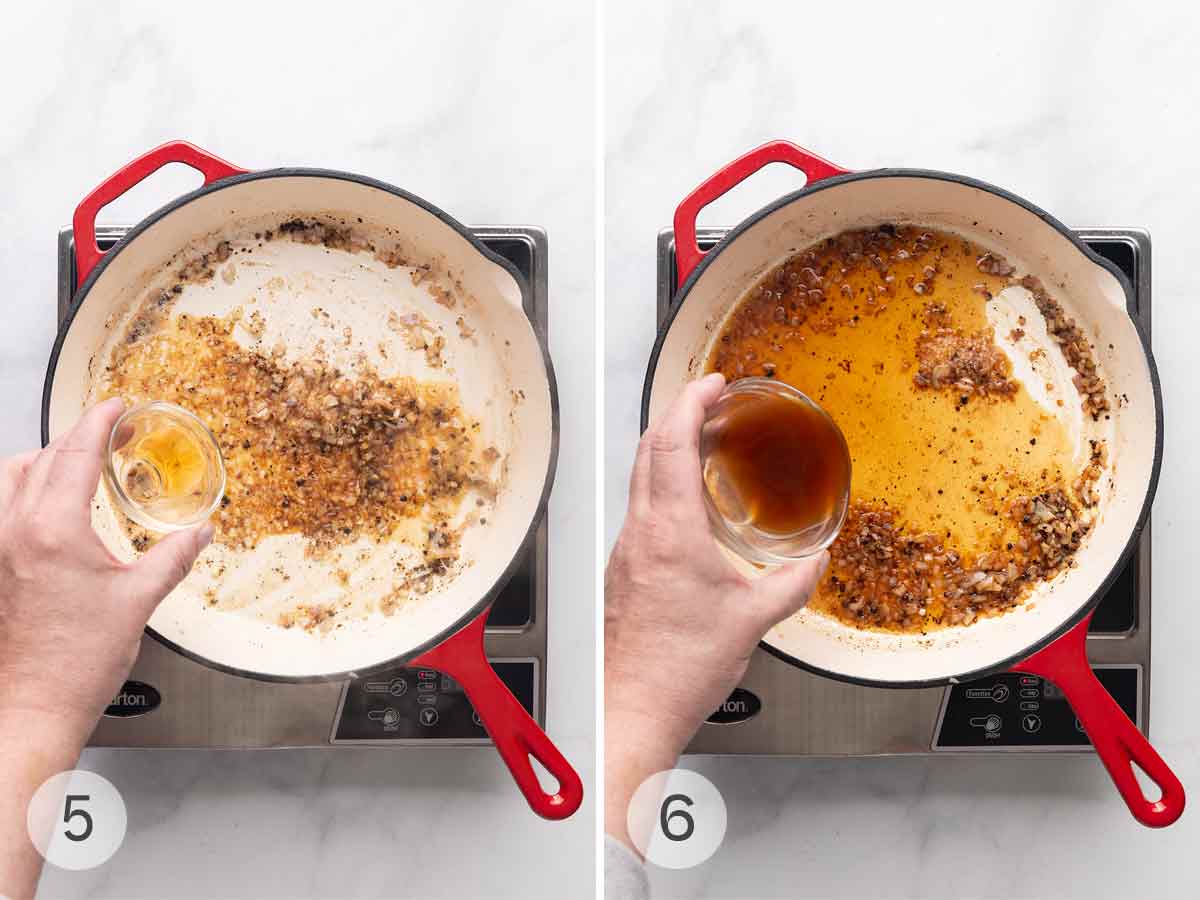
- Lower the heat to medium, add the shallots, and sauté briefly. Pour the Cognac into the pan, scraping up any browned bits from the skillet. If desired—carefully, please!!—ignite the pan sauce. Reduce the heat to low.
- Pour in the stock and boil until thickened.
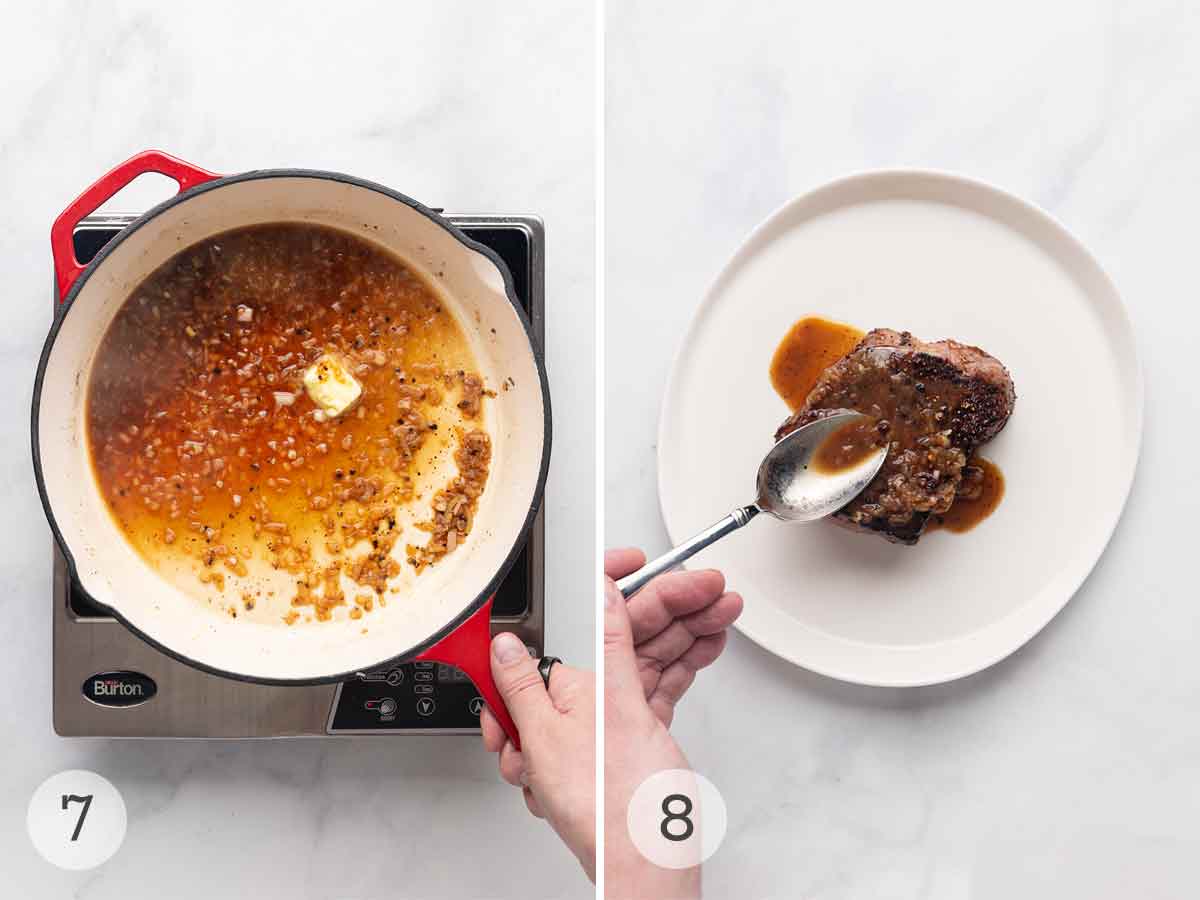
- Taste and adjust the seasoning. Add the butter, and swirl the pan until the butter is melted and incorporated into the sauce.
- Pour the sauce over the steak and garnish with chopped parsley.
Your Steak au Poivre questions, answered
The term “steak au poivre” literally translates to steak with pepper, referring to the crushed peppercorns pressed onto the beef’s surface before cooking.
Although similar, steak au poivre is seared steak generously coated with coarsely ground peppercorns and topped with a buttery brandy and shallot sauce. In contrast, steak Diane is only lightly seasoned with pepper, and the pan sauce may contain mushrooms, shallots, and brandy.
The pan sauce served with steak au poivre is made with sautéed shallots, crushed peppercorns from the seared steak, and brandy. Heavy cream and/or Dijon mustard is often added to thicken the sauce and add flavor.
You can use any good-quality brandy for making the pan sauce. Our testers also had success using bourbon or Armagnac instead of cognac.
Choose a medium to full-bodied red wine, such as Syrah or Sangiovese. The peppery notes of the dish pair well with these types of wine.
Pro tips & troubleshooting
- This meal comes together very quickly, so I recommend having all of your ingredients prepped in advance before you begin cooking.
- Trim the fat on your steak before cooking so that it doesn’t spatter as it hits the pan.
- This recipe is suitable for gluten-free diets.
Storage & reheating
Store leftover steak and sauce in an airtight container in the refrigerator for up to 3 days. To reheat steak au poivre, place the meat and sauce in an ovenproof skillet and reheat in a 300°F oven until warmed through.
What to serve with Steak au Poivre
This classic French dish deserves outstanding side dishes. Pommes frites, or French fries, are a natural pairing, along with pan-roasted mushrooms and pan-fried green beans.
Want to save this?
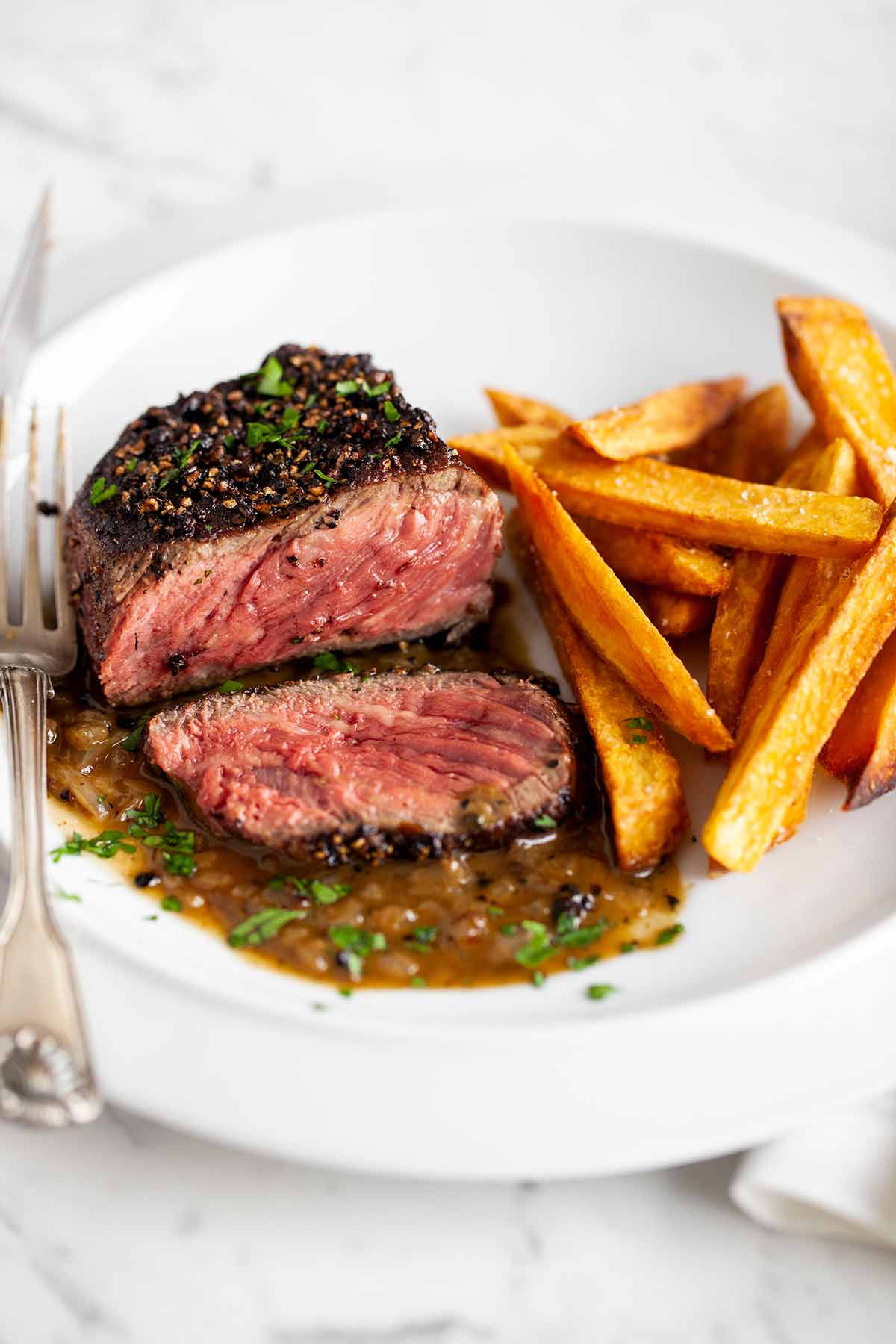
Write a Review
If you make this recipe, or any dish on LC, consider leaving a review, a star rating, and your best photo in the comments below. I love hearing from you.–David
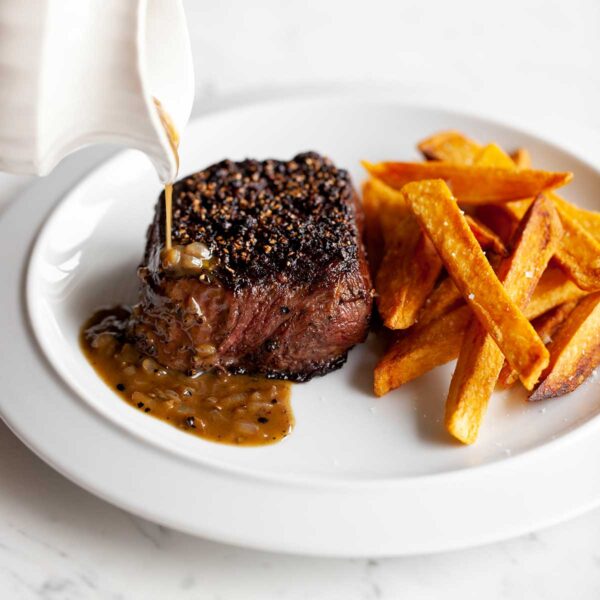
Steak au Poivre
Ingredients
For the steak
- 2 tablespoons mixed whole peppercorns, including black, white, green, Szechuan and Jamaican (whole allspice)
- One (1-pound) thick-cut, well-marbled strip steak*, about 1 inch (2 1/2 cm) thick, trimmed of fat
- Salt
- 1 teaspoon vegetable oil
- 1 tablespoon (1/2 oz) unsalted butter
For the pan sauce
- 2 tablespoons minced shallots
- 2 tablespoons Cognac, (or bourbon or red wine)
- 1/2 cup beef stock or dark chicken stock
- 1 tablespoon (1/2 oz) unsalted butter, at room temperature
For the garnish
- Chopped flat-leaf parsley, (optional)
Instructions
Sear the steak
- Crush the peppercorns using a spice grinder, mortar and pestle, or the bottom of a heavy skillet.
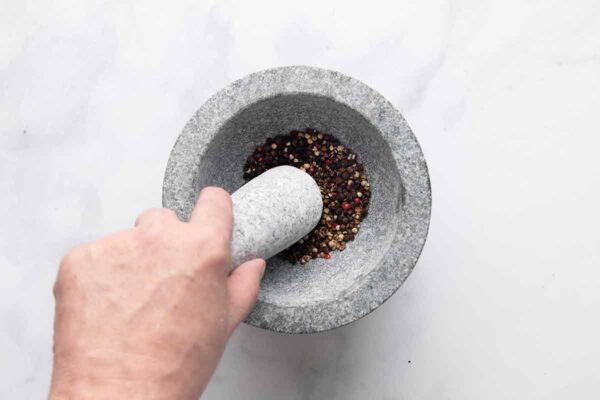
- Generously season the top and bottom of the steak with salt. Press the peppercorns onto both sides of the beef, encrusting the meat as lightly or heavily as you prefer. Cut the steak into 2 pieces.
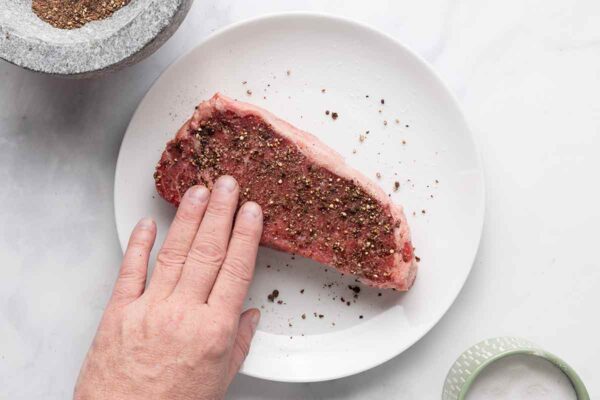
- Heat the oil and the butter in a large, heavy skillet over high heat. When the pan is hot but not smoking, add the steaks. Sear, without nudging them, for about 1 1/2 to 2 minutes, until deeply browned.
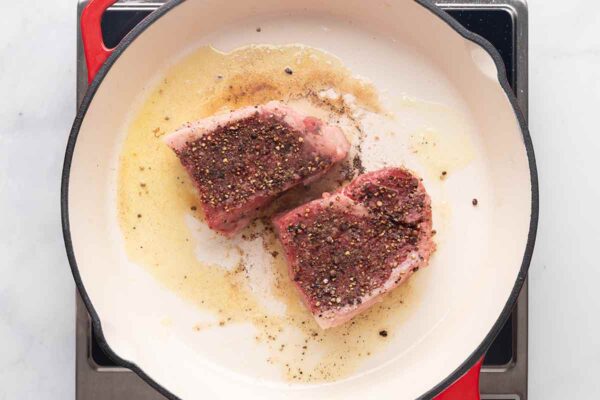
- Flip the steaks and cook until the desired doneness, about 1 1/2 minutes more for medium-rare, depending on the thickness of your steaks.
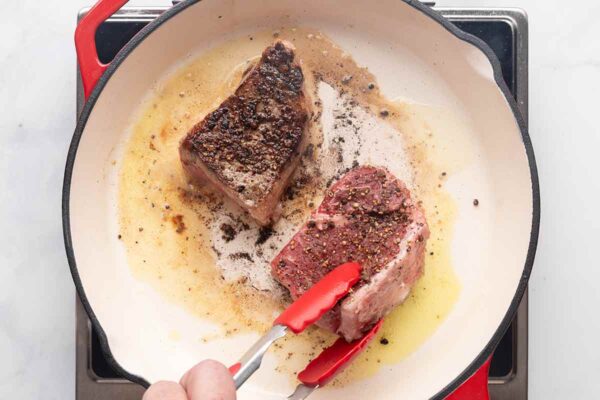
- Let the steaks rest on a warm platter for at least 10 minutes.
Make the pan sauce
- A few minutes before you intend to eat, return the pan with the drippings to medium heat. Add the shallots and saute briefly, stirring with a spoon to scrape the bottom of the skillet.
- Avert your face from the stove and pour the Cognac into the pan. If desired, tilt the edge of the pan slightly over the flame or use a match to ignite the alcohol. Immediately turn the heat down. The Cognac will flame for a few seconds as the alcohol burns off.
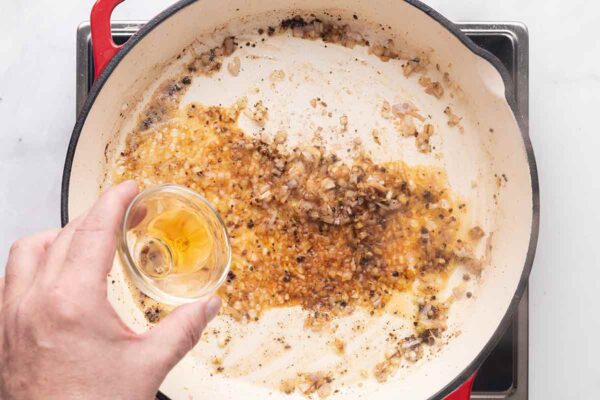
- Once the flames die down, cook for a few moments more, and then add the stock. Bring the liquid back to a boil and cook, stirring occasionally, until the sauce thickens, 2 to 5 minutes.
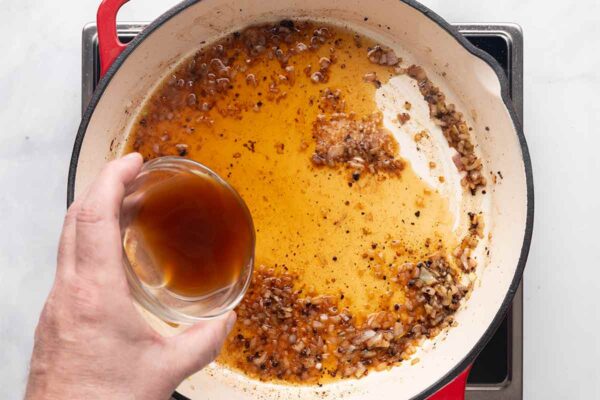
- Taste the pan sauce and adjust the seasoning as desired. Add the butter, and swirl the pan until the butter melts and is incorporated with the pan juices.
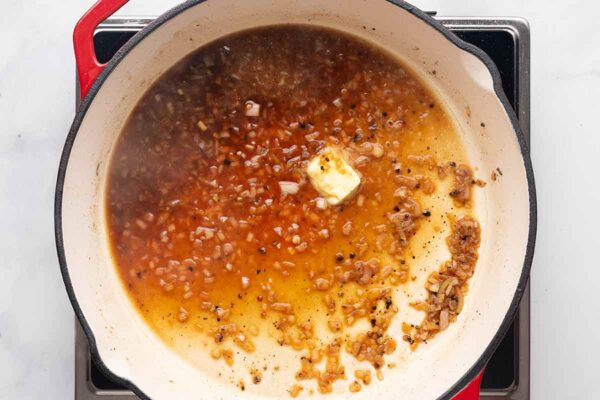
- Pour the poivre sauce over the steaks. Sprinkle liberally with chopped parsley. Serve immediately.
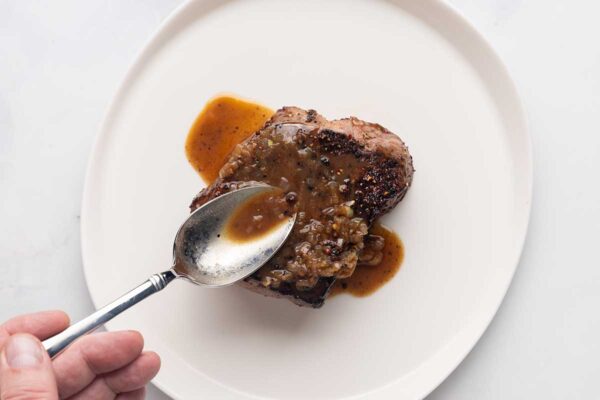
Notes
- Do your mise en place–This meal comes together very quickly, so I recommend having all of your ingredients prepped in advance before you begin cooking.
- Trim your steak–Trim the fat on your steak before cooking so that it doesn’t spatter as it hits the pan.
- Storage and reheating–Store leftover steak and sauce in an airtight container in the refrigerator for up to 3 days. To reheat, place the meat and sauce in an ovenproof skillet and reheat in a 300°F oven until warmed through.
- Dietary–This recipe is suitable for gluten-free diets.

Explore More with AI
Nutrition
Nutrition information is automatically calculated, so should only be used as an approximation.
Recipe Testers’ Reviews
Did you know only 68% of the recipes we test make it onto the site? This recipe survived our rigorous blind testing process by multiple home cooks. It earned the Leite’s Culinaria stamp of approval—and the testers’ reviews below prove it.
This steak au poivre was outstanding. Cooking it, I felt like a real French chef. I even flambeed the sauce for a real show! I never would’ve thought that a recipe like this would be a quick, easy weeknight dinner, but this absolutely was and surpassed my expectations.
The list of ingredients is so simple that you likely have them in your pantry, and it all comes together in a flash. I coated the steaks in black and pink peppercorns—I highly recommend this combo. My steaks were 1 inch thick, and I seared them for 2 minutes per side for a medium-rare steak. They turned out so tender, and the sauce was delicious. I served this with a side of arugula and salt-roasted potatoes.
I used Armagnac in place of Cognac. (my husband told me it’s the same thing but not as expensive as the premium Cognac he nearly caught me using.)
I love Julia Child. From her coq au vin to her steak au poivre. Love. It. There’s a French restaurant in town that we like to go to, and I always tell myself that this time I’m getting something other than the steak au poivre dinner that they serve with fantastic potatoes and broccoli rabe. I rarely get something different. So, when this recipe popped up, I was pumped to bring one of my favorite meals to the house.
This recipe is pretty classic and serves up that rich umami flavor that is so love.
Our steaks were 1 inch thick. I used two New York strips. I seared both of my steaks for 2 1/2 minutes on each side to achieve that really rich crust that I was after. We cooked both our steaks to medium. Total cooking time on high heat was 5 minutes.
This made 2 GOOD servings for us. I think depending on what your dinner plans are; you could easily stretch it to 3 and just boost the sides.
Trimming the excess fat from the steak really helped to cut down the spatter when it hit the hot pan. My steak was 1 inch thick, and I seared the pieces for 2 minutes on each side to our desired medium-rare and then transferred them to a warm oven to rest while I made the sauce.
All the timings were spot on for each step, and the perfectly portioned steaks were melt-in-your-mouth fabulous! The very flavorful poivre sauce turned these steaks into a restaurant-worthy entrée, which can be prepared at home in under 30 minutes.
I served these steaks with creamy mashed potatoes and steamed haricot verts. A very pretty and impressive dinner! We gave this recipe a perfect 10 rating!
I’ve made steak au poivre several times, as it’s one of my favourite ways to make beef for date night. I was intrigued by Julia Child’s recipe, as the recipes I’ve followed in the past called for a bit of heavy cream, whereas this recipe didn’t. I couldn’t wait to try it, and I’m so glad I did. I don’t think I’ll ever go back to using cream.
This recipe has replaced my go-to steak au poivre, as I really enjoyed the sauce. It tasted rich and creamy (the butter helped) and complemented the peppered steak. Plus, the mix of peppercorns made a difference, as I had used only black peppercorns before.
This is my favorite way to eat a steak, but I’d never made it at home. This recipe is one I would make again any time. The steak took almost no time at all to cook. The sauce was full of flavor and the perfect complement to the peppered steak.
Next time, I won’t sprinkle it with parsley, as I felt it was more of a garnish and wasn’t needed. I served this with baked potatoes and salad, and it was perfect. I love it when there are just two of us for dinner, and I can make a cozy meal like this.
Julia Child’s steak au poivre was an excellent change from our weekday routine. It came together quickly, and we enjoyed it immensely.
I served it with some thick-cut fries and asparagus, which both were improved by being mixed in with the sauce.
Overall, this steak recipe tastes fancier than the effort involved in its cooking, which is a weekday win!
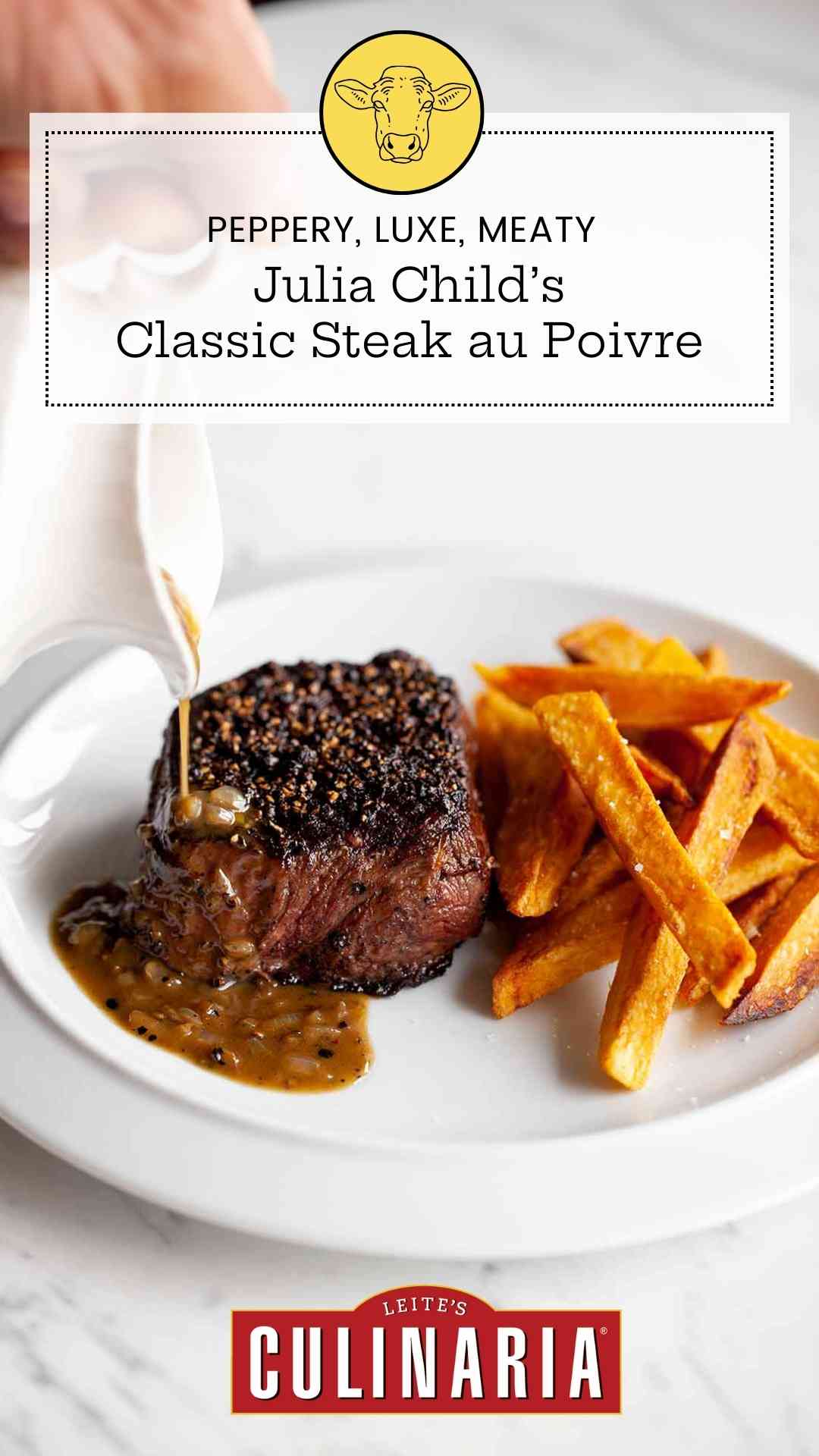
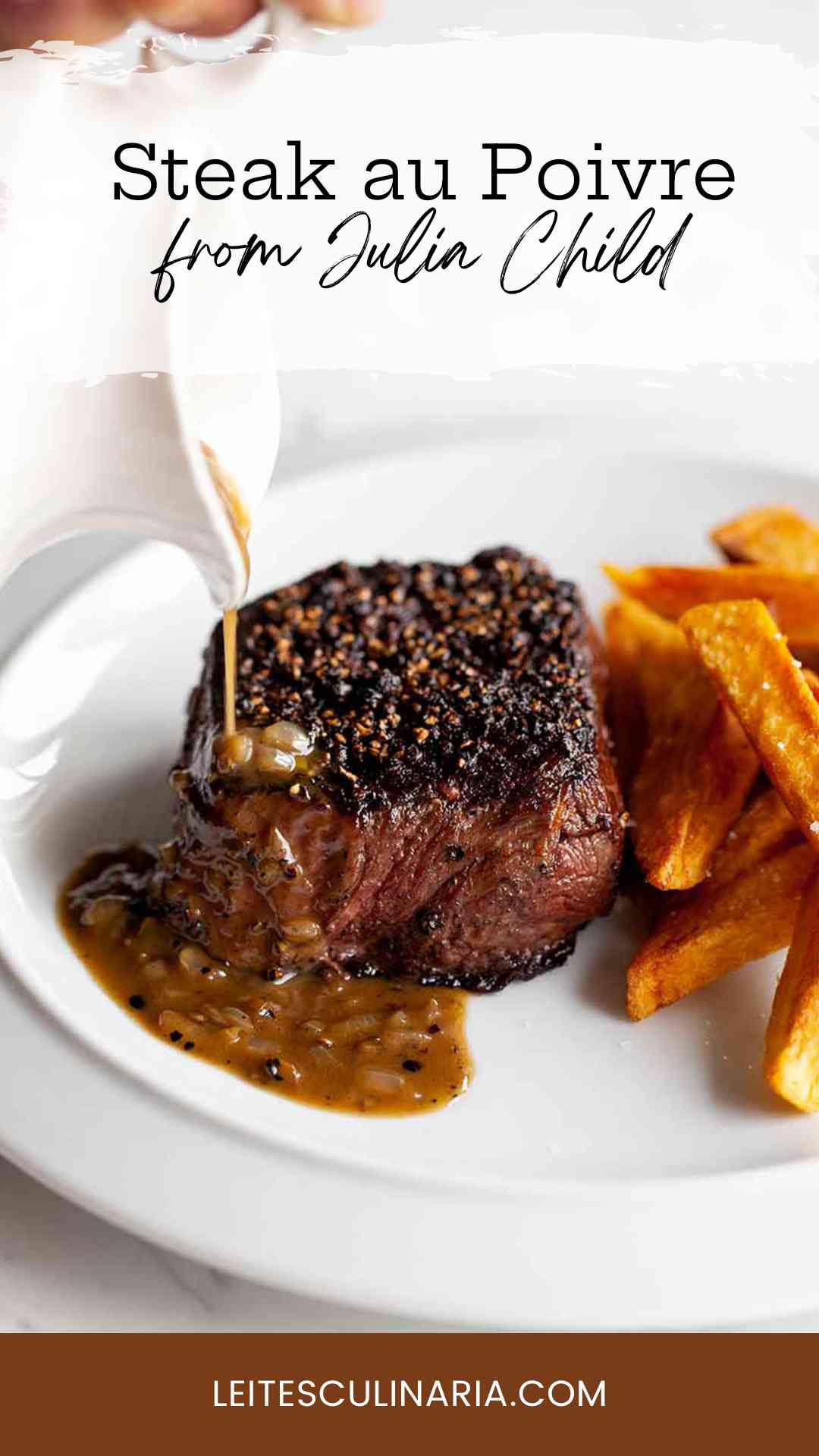
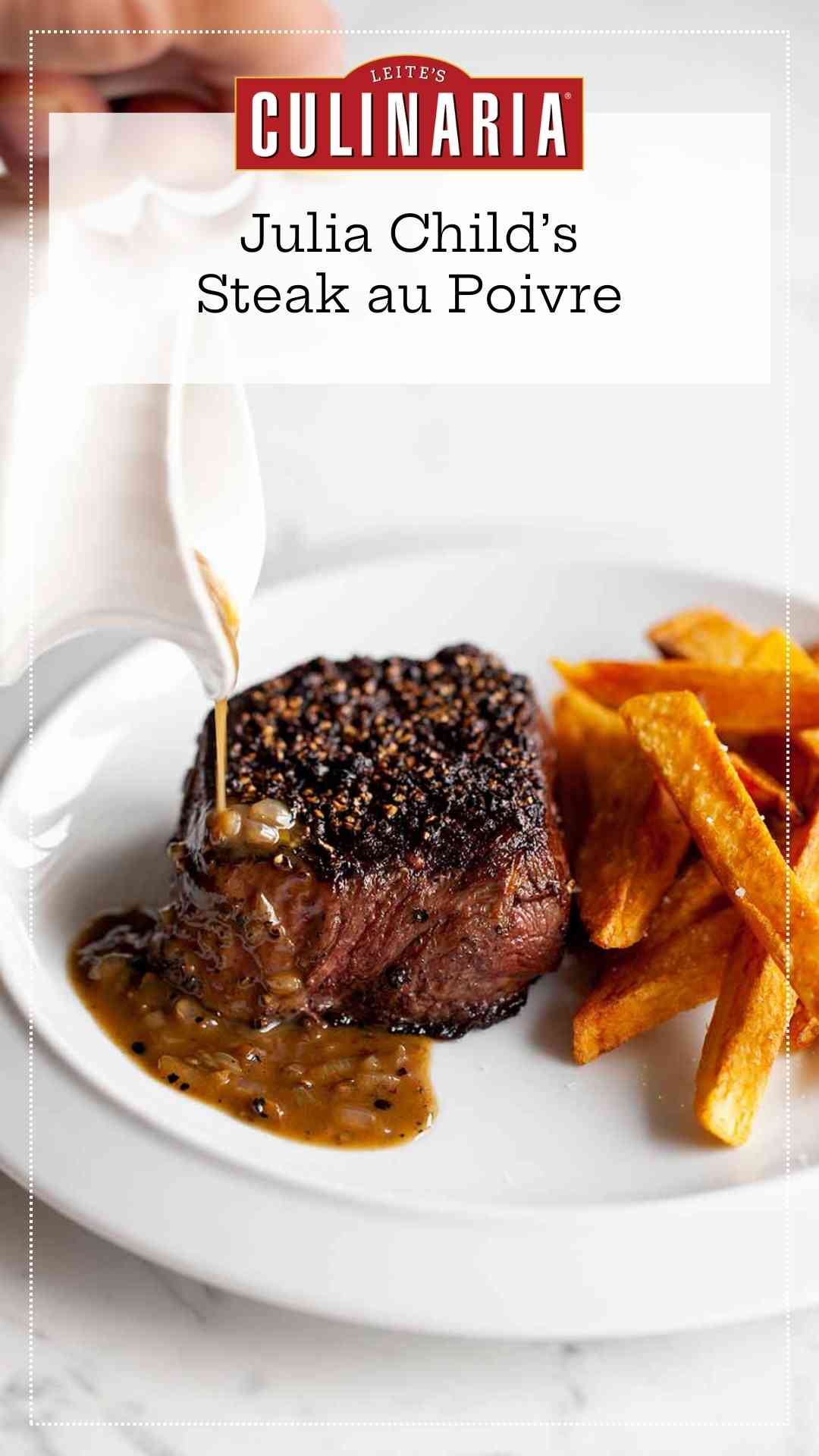
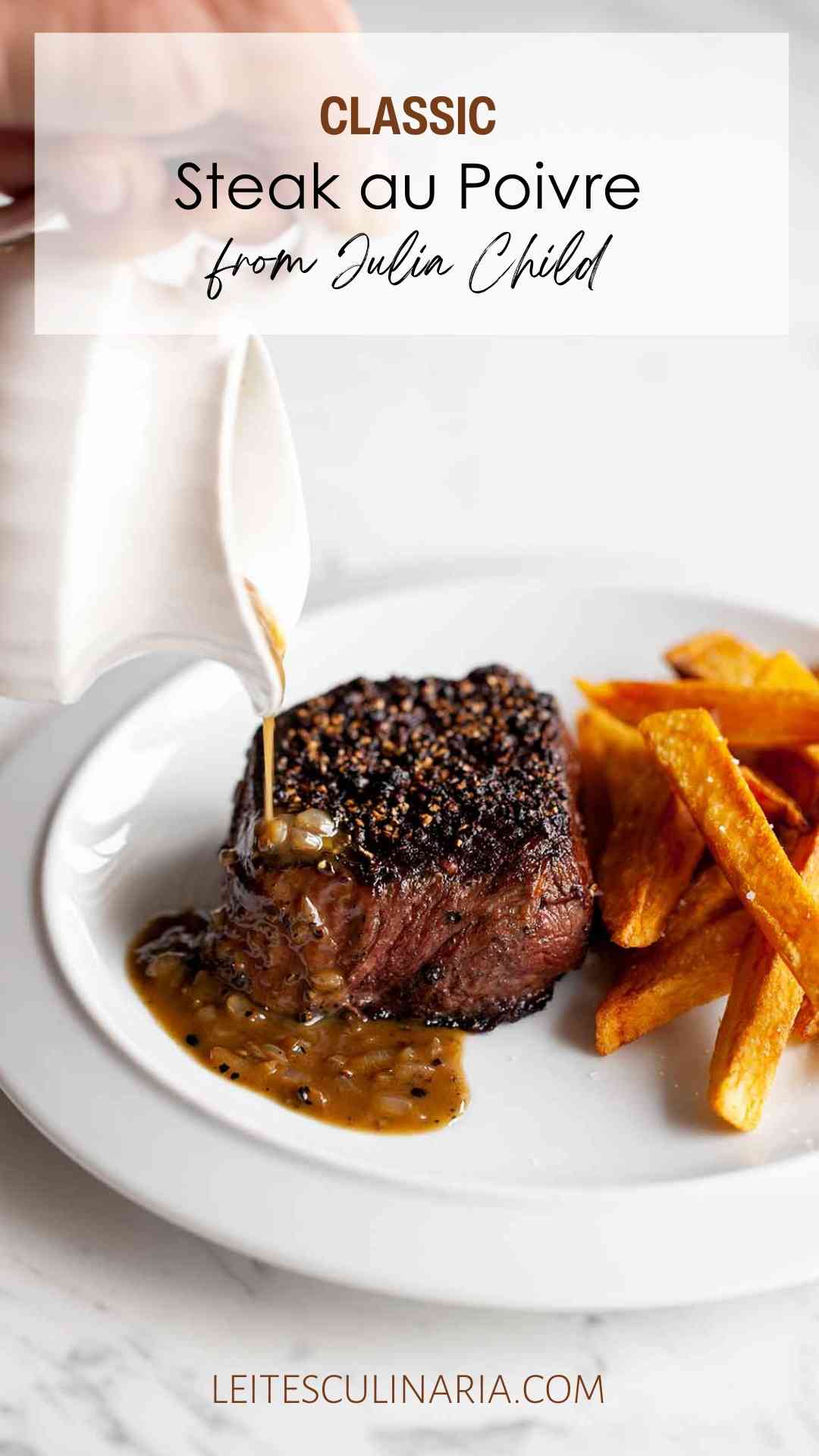
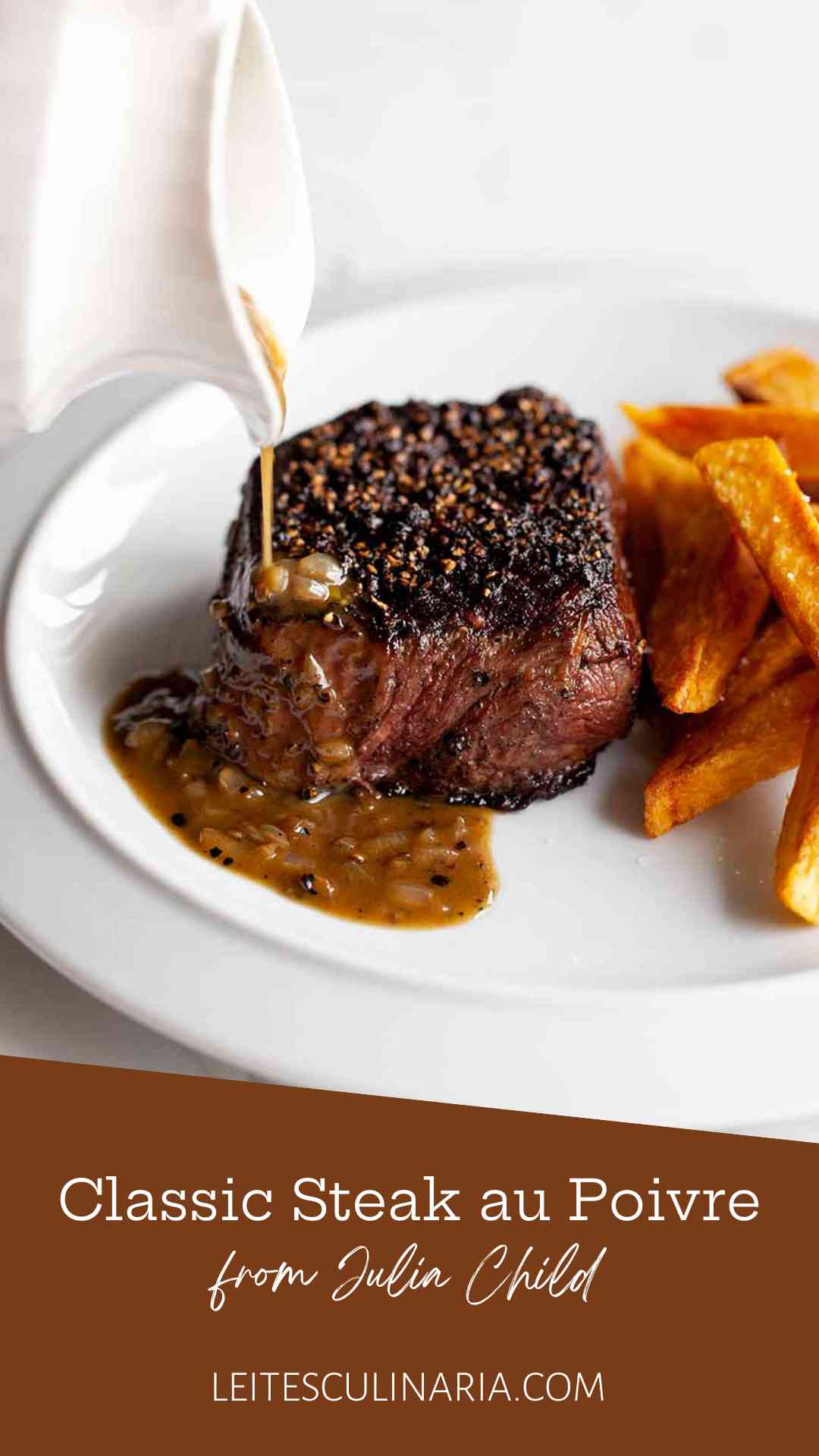
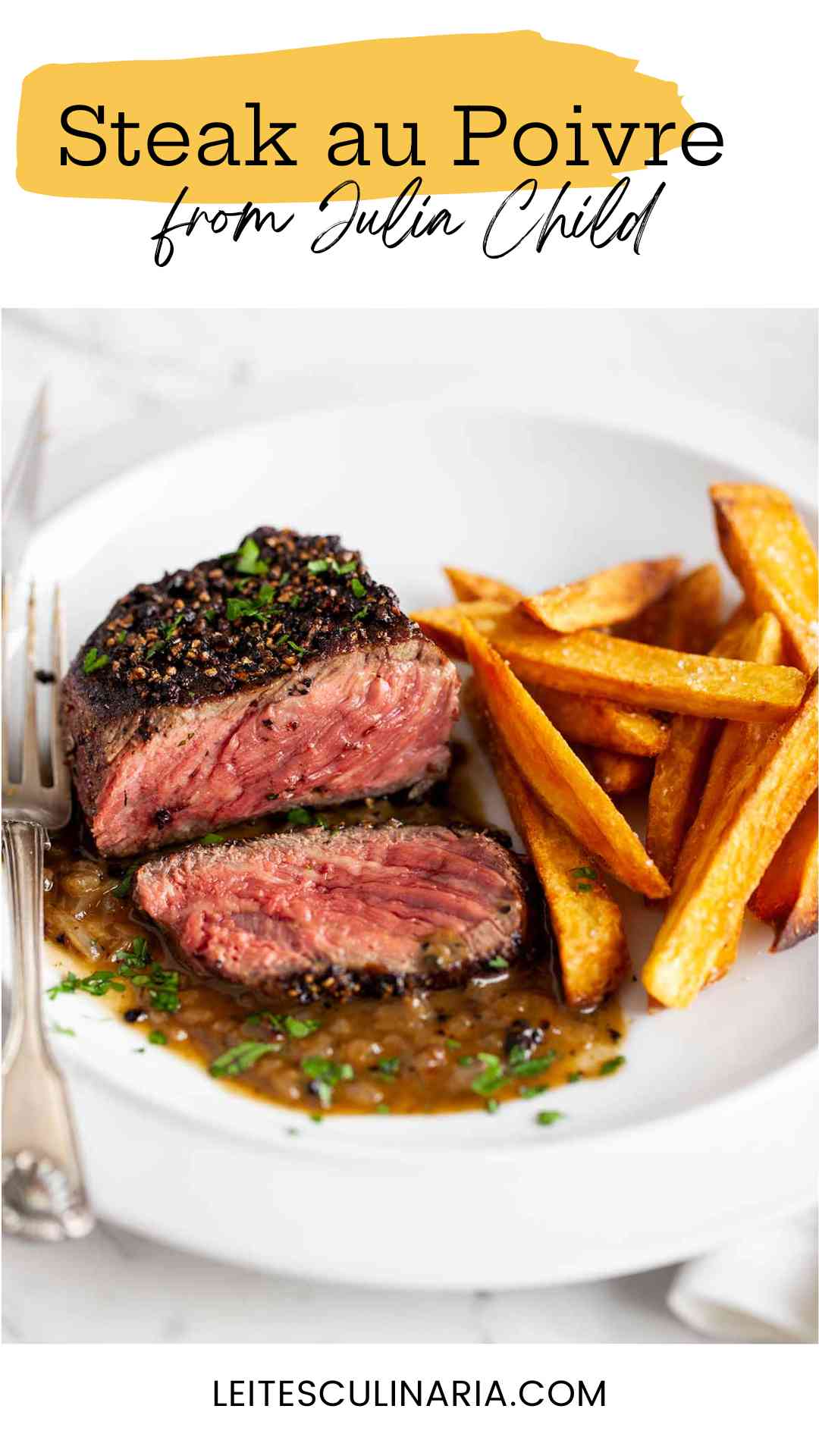
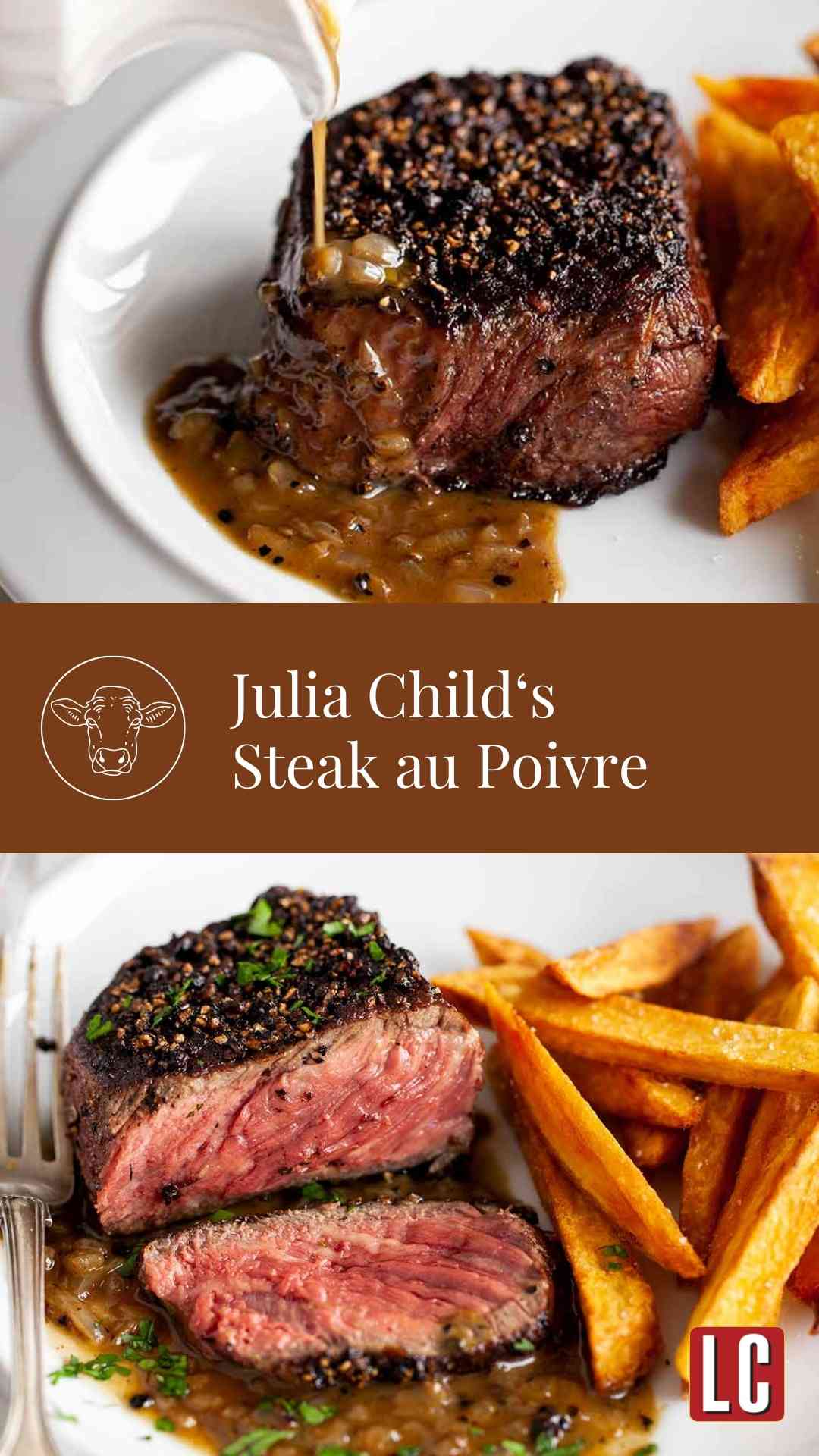
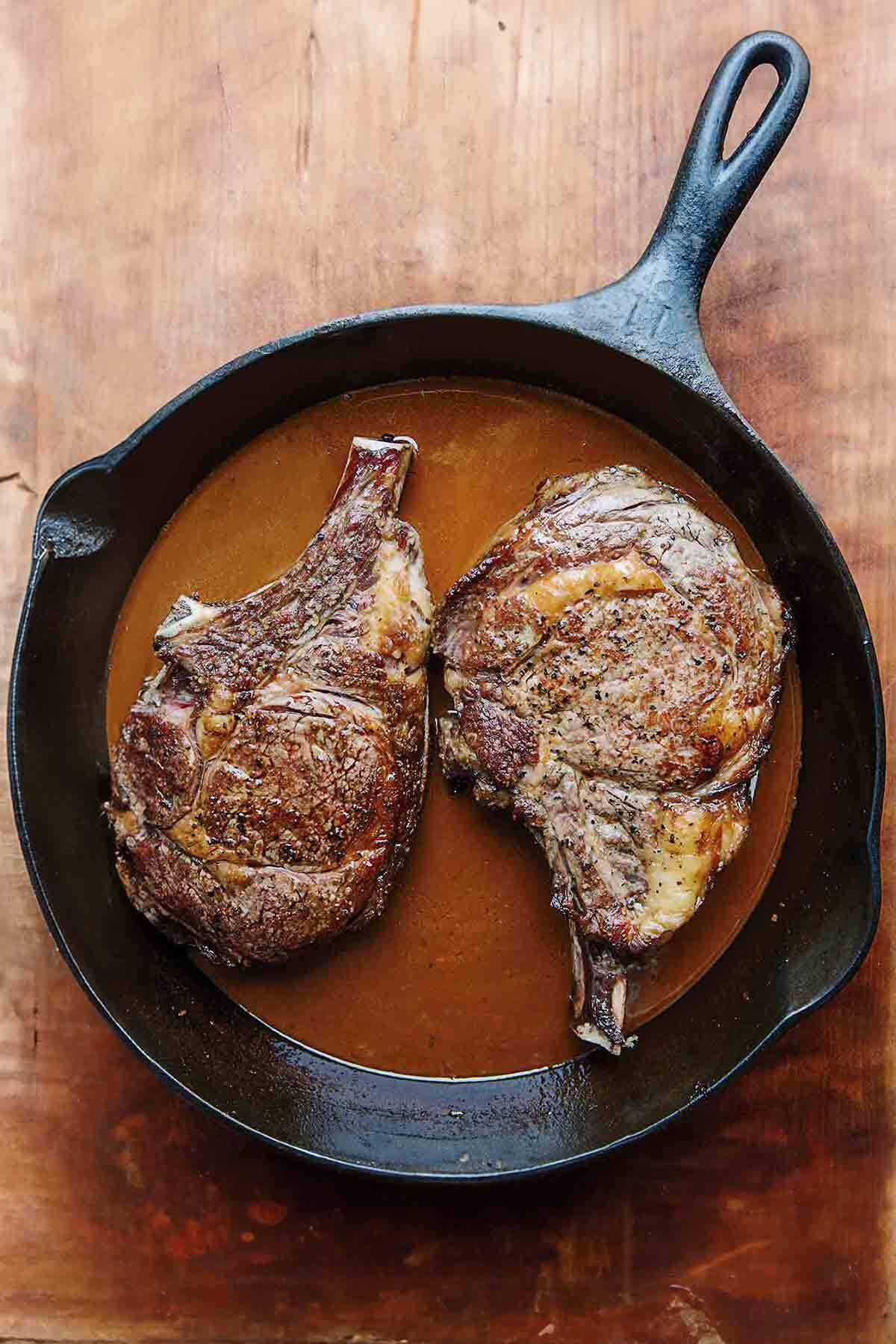
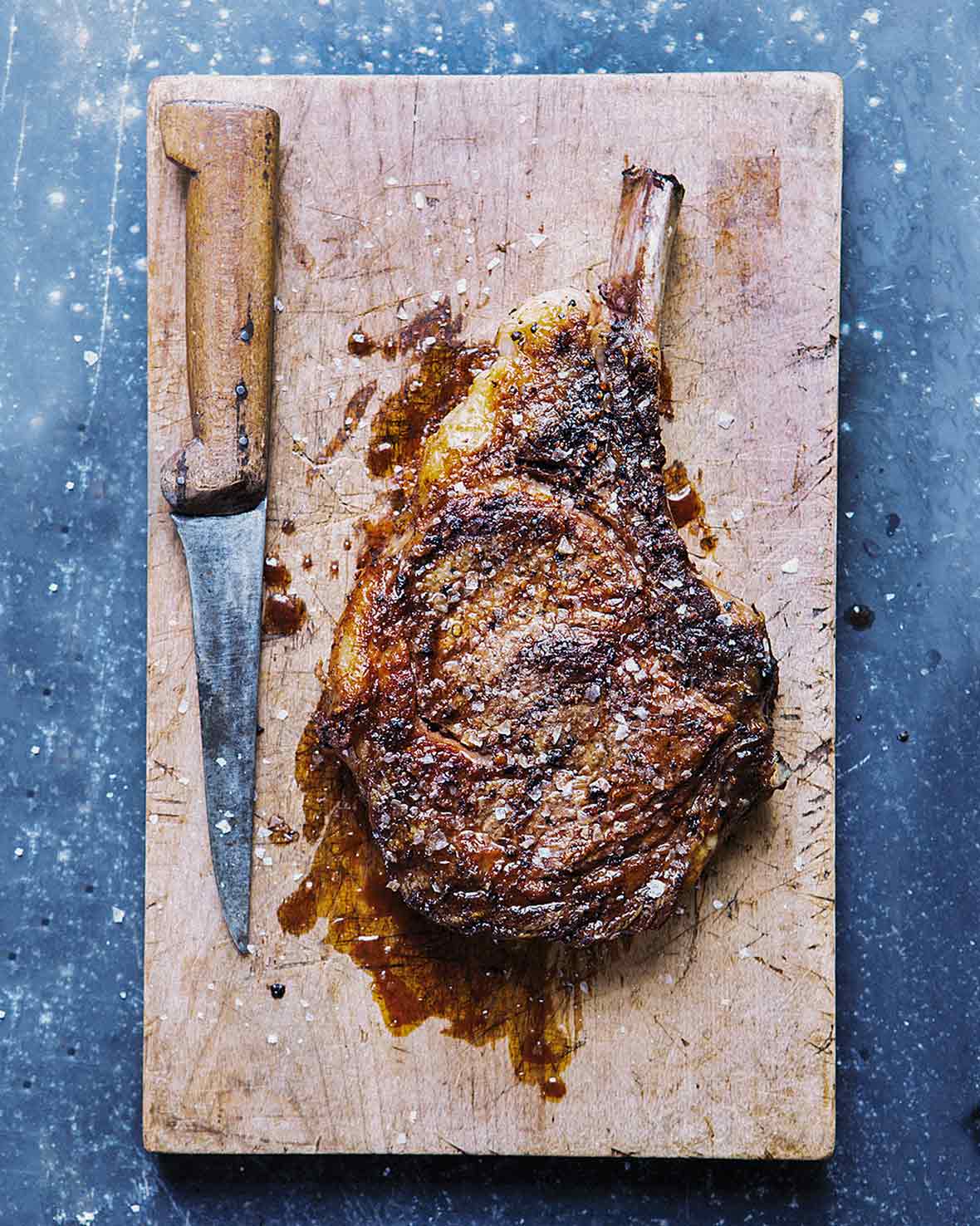












It was even better when I left two steaks embedded with peppercorns and salt in the fridge for a few days. It was accidental because we had a time thing, but it worked out perfectly. Oh and if you’re using a meat thermometer always undercook it by 5-10 degrees to get the real doneness.
Thanks, Peter. That looks fantastic.
Is there any way to make the steak at poivre using a grill? And making the sauce separately? My concern is smoke/fumes from searing the meat in the house.
The flavor would be different if you were to do it on the grill, Holly. You wouldn’t be able to create the same depth of flavor in the sauce without the drippings from searing the steak and the steak wouldn’t develop the same crust on the grill. If you run your stove hood fan while you’re cooking, there shouldn’t be more smoke or fumes than it can handle, and if opening your windows is an option, that will help, too.